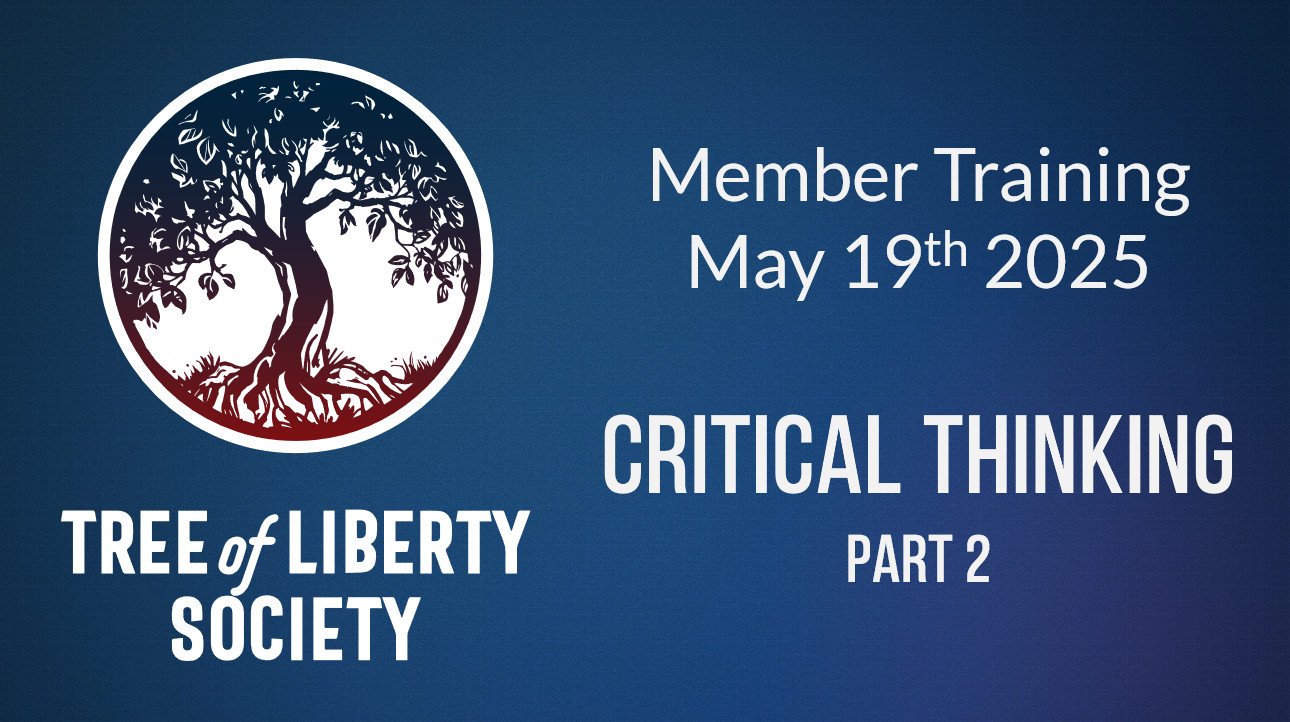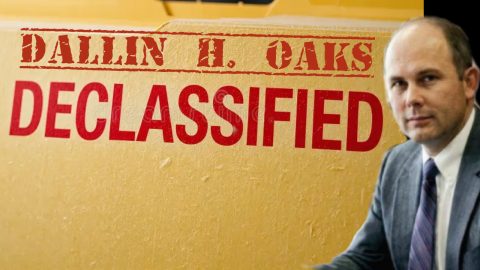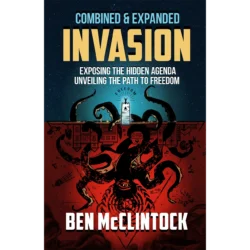Member training from May 19th 2025.
This presentation, Critical Thinking Part 2, In this discussion, I emphasize the importance of critical thinking and logical analysis in the fight for liberty. I illustrate how easily individuals can be manipulated when they fail to engage their reasoning skills, using visual examples and historical warnings from the Founding Fathers. The presentation explores deceptive tactics used to shape public perception, the dangers of accepting vague or misleading statements without scrutiny, and the necessity of evaluating truth claims with precision and consistency. By applying principles of clarity, accuracy, and logic, I demonstrate how to resist manipulation and maintain an informed, independent perspective, ensuring we are not misled by false narratives or empty platitudes. Ultimately, this is a call to reclaim intellectual responsibility and strengthen the resistance against those seeking to erode our freedoms.
Help support ad free content with a one time donation or becoming a member today.
Thank you to our sponsors
https://connollyandsonsconcrete.com/
https://www.dentistry4health.org
http://www.highercallingfirearms.com
http://www.americanappliancehvac.com
https://insurewithcompass.com/sbarlow.html
TRANSCRIPT
Dear Heavenly Father, thank you for this time we have come together to learn and
grow. Please bless us with light and minds and a flow of intelligence from thee.
We’re grateful, Lord, for all those dump trusts and
we wish to have the courage we need to do as we must. We say these things in the
name of Jesus Christ, amen. Amen. So I wanted to do a recap because it was about
three weeks ago that I did, that we did this. We started this series of
presentations. So I just want to do a real quick overview before we get into what
we did, what’s going on this week. So let’s see here. Sorry, I want to
bring
That over here so I can okay, I Apologize okay,
so just as always what is the purpose of training so that way you can get the
context of the reason Why we’re going over these principles? We need to build the
understanding of the principles that have built free nations We need to expose They
say kind of conspiracy and we need to build an effective resistance to that
conspiracy. And so in conjunction in the effort to fulfill all three of those,
we want to learn how to more effectively engage our critical thinking skills.
So just a real recap, we got three or four different slides going over that
presentation I went over three or four weeks ago. And this video right here is a
really important example of how easily we are manipulated, especially when we don’t
use our critical thinking skills. Despite what you might be thinking, these two
circles are not equal. I repeat, these two circles are not equal. One is in fact
larger than the other. What I need you to do is determine which one that is. So,
please raise your hand if you believe the blue circle is larger than the
All right, please raise your hand if you believe the red circle is larger than the
blue Very good now before I said anything about these two circles. What was your
first instinct?
Equal right because they look equal the reason why they look equal is because in
fact they are equal these two circles are identical Yet, I got just about every one
of you to raise your hand and say that they’re not So what do we learn? But you
can be manipulated like that to believe in something that goes against your natural
instincts. Just imagine, just imagine as a child, you’re caught that the blue circle
is larger than the red. If you say it enough times, you can convince yourself that
the truth.
So this is just an example of how easily we are manipulated. Too often we put
forward this idea of an expert, right? We’re listening to someone and they’re giving
us a presentation. And we have our first inclinations and this one right here is
because we have eyeballs and we have the ability to see. And so we said, oh, in
our minds that, oh, they’re the same size. But then he told us that they weren’t.
And so we questioned ourselves to thinking, oh, there must be something, an optical
illusion that makes them look the same when they’re not. Well, that wasn’t the case.
He was lying to us. And that’s what happens too often. And when we turn off our
critical thinking cap, we get suckered into the lies that are being told to us,
especially regarding our liberties. And so it’s important that we don’t do that. We
don’t turn off our thinking cap.
And so the scriptures warn us of this. We learned from the Apostle Paul and
Colossians that we need to beware lest any man spoil you through philosophy and vain
deceit after the tradition of men, after the rudiments of the world, and not after
Christ. So people are trying to fool us, and so it’s important that we are aware
of that, and one of the best ways to be aware of that or be aware of that is to
have critical thinking. And so what, where I heard,
let’s see here. Okay, Mark, yeah, you have a question.
You don’t have to unmute.
Thank you. Keep forgetting. Yeah, logic, another way of talking about what you just
presented is logic supersedes persons. Remember what God said, he’s not a respecter
of persons. So his law comes first against ahead of anybody. So that means you
could have the most trustworthy person in the world that you think is trustworthy,
but logic supersedes him and God’s law supersedes him. And I think that’s really
important that we’re required to use our minds, use logic. I don’t use critical
thinking, as I talked about before. If you look, the challenge for you, Ben, is to
look at the curriculums, because it’s broken down, critical thinking is broken down
in different categories. And you’ll find one of them that is not based on logic.
But anyway, I rely on logic to a large extent, so does critical thinking, but it
doesn’t entirely. But anyway, back to the main point is that we always need to know
that logic supersedes persons and that requires effort on our part to use logic and
not rely on just people It’s not be lazy Appreciate that. Let’s remind just a
reminder just to make sure we keep the comments at the end and in the comment
section and Questions during the presentation, but thank you mark So what is this
that we’re referring to tonight? That is that critical thinking is the general term
given to a wide range of cognitive skills and intellectual dispositions Needed to
effectively identify analyze and evaluate arguments and truth claims, to discover and
overcome personal prejudices and biases, to formulate and present convincing reasons in
support of conclusions, and to make reasonable, intelligent decisions about what to
believe and what to do. So this is a mixture of basically two different things. On
one hand, we want to make sure that we’re not being fooled, but on the other hand,
we use critical thinking to help others come to a logical conclusion to make sure
that they’re helping the cause of liberty and not continuing in being fooled
themselves by the conspiracy. So there are four dimensions to critical thinking and
those are the skills required to evaluate arguments and truth claims, the skills
required to overcome personal prejudices, the skills required to clearly formulate good
arguments and the skills required to make intelligent decisions about what to believe
and what to do and We need to remember that the truth is knowable as the Savior
said he’s talking to the Pharisees that You are of your father the devil and the
lust of your father you will do He was a murder from the beginning and abode not
in the truth because there is no truth in him When he speak of the lie he speak
it of his own for he is a liar and the father of it. So he’s saying that they
are liars, which means that the truth is knowable. So these critical thinking
principles that we’re going to go over tonight, we have one, is we have to focus
on clarity and accuracy, precision, consistency,
and that they’re logical and that they’re relevant. Okay, so those are the six tools
we’re going to go over this evening. So I want to bring up the idea of talking
about clarity. We look at the book, The Sickness Unto Death,
written in the 1800s. He is a theologian and he wrote this book about how to
understand certain principles. And so I’m going to read from the book. This is in
the opening paragraph. It says, a human being is spirit, but what is spirit? Spirit
is the self, but what is the self? The self is a relation that relates itself to
itself, or is the relations relating itself to itself in the relation? The self is
not the relation, but is the relations relating itself to itself? A human being is
a synthesis of the infinite and the finite, of the temporal and the eternal, of
freedom and necessity. In short, a synthesis. A synthesis is a relation between two,
considered in this way, a human being is still not a self. In the relation between
the two, the relation is the third as a negative unity, and the two relate to the
relation, and in the relation to the relation, thus under the qualification of the
physical, the relation between the physical and the physical is a relation. If,
however, the relation relates itself to itself, this relation is the positive third,
and this is the self.
So, you know, right, so, huh, right? This is not clear.
We need clarity on this, there are some questions that would need, before we said,
do we agree with this, do we disagree with this, might be the most wise statement
ever made. So, you know, right?
So, you know, right, there needs to be clarity to be able to make heads or tails
of this, right? There are some key questions we need to know to get in the habit
of asking before we even begin to evaluate an idea. So,
right, we would ask the person, “Could you elaborate further? Could you give me an
example of what you’re referring to?
Could you illustrate what you mean? What do you mean by the word and then fill in
the blank of what word you would like them to define for you?
So these are the clarity. Those are things that if we read something like what we
just read before or you’re discussing something with someone and you’re just totally
lost as to what they are saying, before you can have even a good art.
Like, do you know what they’re saying? You’re like, can I, do I, do I need to
accept or do I need to reject what you just said? We need to ask some clarifying
questions. And when you’re not dealing with a conspirator, you’re just dealing with
your fellow man, and you’re trying to come to an agreement together, to reason
together, we can do that, we can ask them to elaborate further, we can ask them to
give an example, example, because, you know, the people that we deal with on a day
-to -day basis are typically not satanic conspirators, they’re just maybe influenced by
satanic conspirators. And so by asking these types of questions, if they are
influenced by an evil person, by asking these types of questions, you can actually
help them come to that conclusion themselves, they can come to that understanding
themselves.
Yeah, Yeah, Samantha says that can you say it like I’m five? Precisely
so now let’s get into the idea of
Accuracy Okay, so I’m gonna play a clip from an a television show from my childhood
called Cheers And one of the characters on there’s name was Cliff Clavin He’s not
on some of you might have might be too young for that or may not have watched the
show, but he was always the know -it -all, and so it’s important for us to, right,
if somebody claims to be informed on an issue, we need to kind of think of what
they’re saying, if there’s logic to it, if it’s accurate. I still say that Kennedy
could be president someday. Oh, no way, no way, maybe the next time,
you know how politicians are. I I don’t think so there, Doreen. I’ve got a pet
little theory about that. You see, if you go back in history and take every
president, you’ll find that the numerical value of each letter in the last name was
equally divisible into the year in which they were elected.
So who’s going to win? Reagan again? No, not a chance. I figured it out.
By calculations, uh, our next president has to be named Yelnick McWahua.
That’s the stupidest name I’ve ever heard. Son, please, you’re talking about our next
president.
So it’s important that we’re accurate. It’s the idea of the boy that cried wolf.
When we are just putting out some kind of a pet theory that we like, And it’s
just nonsense, then, you know, we either we lose our credibility with the critical
thinker, or we, like with coach there, we lead them to a faulty,
a false conclusion. Yes, Mark, go ahead, you can unmute.
Doesn’t that also fall into the category of illogical or not logical that’s coming
up? Yes. Yes, absolutely. That’s why I saw mostly. Yeah. So it’s just nonsense.
So accuracy on real life application, right? We have a guy running for office. He’s
a political candidate and he says something along the lines of I trust the people
to make decisions for their own lives. We don’t need government poking its nose in
every aspect of our lives.
And so you’ve got the naive voter. He says, oh, that’s great. That’s exactly what
I’m looking for, right? I like him. He looks me in the eye.
So we can ask ourselves like, well, what’s wrong with this? You know, it’s a he’s
saying that we
that, you know, don’t you like a guy that doesn’t want to poke his nose in all of
your business? So a critical thinker is going to ask the question, you know, because
this is not really an accurate — there’s no way to make an accurate conclusion to
what’s being said here. So there’s some obvious questions that a critical thinker
would be asking. So why is he speaking in platitudes? Does he think people should
be able to kill unborn babies? You know, I don’t want to be in your business.
That’s the privacy argument that’s brought up when he was talking about killing
babies. And then another question would be, he said, “Every aspect of our lives,”
they shouldn’t be involved in every aspect of our lives, which implies that he
thinks that the government should have some control over certain aspects of our
lives. And so what part of our life does he want control over? And there’s could
be other questions that a critical thinker is going to ask to try and get an
Accurate understanding of what the politician means when he’s giving the platitude
statement So accuracy Another thing that we see here all the time of inaccurate
statements being made on the internet, right? There it’s these Facebook posts talking
about a deadline and that they saw it on the news and that you know all of these
You know that they’re trying to say that you can’t Facebook can’t use your posts
for any of their advertising and that it’s all private and you’ve copyrighted it.
It’s nonsense. This is When you go on Facebook, it’s there. It’s their property and
they can use your post in however way they want to no matter what dumb This
claimer you claim was on the news because it wasn’t you know people that are
forwarding this they’re just forwarding it from somebody else I like how it says,
you know channel 13 News talked about it tell 13 what like it’s it’s nonsense.
It’s just made up and it it’s foolish and Because of that if we believe that now
we’re going to do something and we’re gonna think that we’re protecting ourselves
when we’re not we are going to
Maybe fool others into thinking that they’re protecting themselves and so you know
without without asking our, you know, without critically thinking, without asking
critical questions, we’re going to be led down a bad path. Another thing that,
you know, that inaccurate thing that was something that a lot of people in the
Liberty movement were grabbing onto was this idea a few years ago that Walmarts were
being turned into FEMA camps. This was like in 2012, 13 -ish,
if I remember correctly, Maybe a little bit later, maybe 2015. Some kind of camps.
They’re not FEMA camps.
Almost camp. People that go shopping in their pajama camps.
But FEMA camps, they are not. And so somebody puts it out there and all of a
sudden we believe it. You had Hal Turner going out there and claiming that he had
you know leaked these you know leaked to him from the from Hillary Clinton these
amaryll coins back in 2009 and it just was nonsense and people that were spreading
it were were losing their credibility and then you have other people talking about
martial law being declared and these FEMA camps are going to be uh COVID -19 FEMA
camps are being approved and the military is going to be setting these things up be
soon for anybody in America that’s, you know, that’s resisting the government. And so
all of these things, you know, when we’re not accurate, when we don’t, when before
we share something, we don’t ask critical questions. Now we are going to be fooled.
We are going to do the wrong thing. And we are going to get others to do the
wrong thing. And so it’s important that we engage in critical thinking. And then we,
you, And that is manifest through questions that will help us to find out if what
is being shared is true or not. We can’t just, you know, especially with what we’re
dealing with, it’s vital that to maintain our credibility that what we share is
accurate. And to be able to make sure it’s accurate, we have to do a little bit
of extra digging so that way when we are sharing something that is so you know
pretty big deal we people know that they can trust us so
precision and precise words that work their way into confuse using words that are
not exactly accurate are a great way to confuse people into
the into not doing the right thing. And so a lot of times you’ll hear in the news
the word many the word a lot. I just said it. It’s a filler word almost,
but almost everybody, the majority. Let me go back here. So this is something that
is used by the conspiracy to get people to say, oh, I,
you know, there are a lot of I don’t want to be on the outside. People are but
other the majority of the people can’t be wrong. And so it’s, if you guys have
ever seen that show, who wants to be a millionaire, one of the lifelines for a
question, if the individual didn’t know the answer, they wanted to pull the audience
because the majority of the audience is generally going to be correct. And so as it
was the thought process. And so we’re manipulated into accepting an idea when we are
told that many people do this. A lot of people do this, almost everybody, the
majority of the people. And so that we don’t want to look like an idiot, being the
only one not believing this thing. And so it gets us to go along with the story.
And Exaggerating is all so bad. Yes, always everyone doctors say this can yes those
are great examples and so just an example of How this is used you have sucker a
most scientists agree that the theory of multiverses going back to Micah’s
presentation You know most scientists believe that the you know agree that the theory
of multiverses provides the best explanation For the precision of the physical
constants in our universe that make it perfectly balanced for human life. So that
that’ll be an idea, right? Most scientists, well, you know, scientists, they’re smart.
They went through edification, and they, you know, they know a lot more than I do,
and why would I disagree with most of the scientists? And so a person’s gonna say,
well, if most scientists agree, then I guess I’m wrong. So I better go along with
most scientists Instead of asking critical thinking questions like What study or
survey did you get the information from right who funded this did? What were there
scientists that weren’t allowed to have their voices heard? What is the margin of
error right if they what how many scientists did not agree with the theory of
multiverses? Right, if it’s 51%, that’s much different than 99%.
And we had this same issue during the fake pandemic where you had the CDC as a
body approving vaccines or looking through and approving medicines, Poisons to be
approved by the government and they’d say oh the CDC approved this well when you
come to find out The CDC board. It was actually just barely over 51 % of the board
approved it So that’s you know, that’s saying a good chunk of the CDC board Didn’t
think that that was safe and didn’t want it to go to market That’s that’s an
important question to to be considered if you’re looking to experts for something
that you want to ingest into your body. But, you know, then ask yourself or ask
the individual telling these things, “Who are some of the scientists that would
disagree with the theory of the multiverses?” Maybe that they’ve got to…
There are a lot of times where the one guy that was wrong, he has methodology,
and so he’s going to, if he’s disagreeing with everybody else, that would be
important to understand. Another question, right? If a majority of scientists say
there’s no God, does that make it true? Well, of course not. The idea of just
because the majority say something is true or not true is irrelevant, right? The
truth is not dependent upon the majority. We don’t get to vote. there’s no democracy
in deciding truth. And so we need to ask ourselves that question too,
just because the majority say something big, stinking deal.
So lack of precision is usually the sign of a weak argument, because they want to
obfuscate the point in a way that will make you just assume something and not
actually ask questions because you don’t want to look like an idiot.
So consistency is also another important thing when we are using our critical
thinking or our logic, right? We have a professor here where he states that
something can only be true if you can prove it scientifically.
Well, that statement of itself can’t be proved scientifically.
So that statement itself is not consistent with the premise. And so we have to
understand what is logical to be able to do that. We have to look at the non
sequitur as another way to put it. You have the definition is the term non sequitur
comes from Latin and translates does not follow, a non sequitur occurs if the
premises don’t justify the conclusion. Go in an example, all trees are tall, all
tall things are yellow, therefore all tall all trees are green.
And so just makes the conclusion makes no sense based on the evidence.
There are other you know ideas of people live longer since television was invented,
therefore vision makes people live longer.
Okay, so non sequitur, there was a budget surplus of $30 billion in 1997.
And then the budget surplus went to $122 billion in 2000 under Clinton.
So the Clinton must have really got spending under control. And he must have been a
He’s putting that putting the the bootstraps on and making sure that the government’s
not wasting any money That’s that’s what people are. That’s the conclusion that you
know, it’s not logical. It’s non sequitur Congress first of all Congress sets the
budget. So it’s got nothing to do with Bill Clinton spending in 1997 was one point
six seven trillion dollars
And then in 2000, it was $1 .789 trillion, so spending actually went up.
So over $100 billion, it went up.
So neither the president nor Congress should be called fiscally conservative because
just what that means is that they collected more taxes if they had a surplus. So
they were just stealing more from while they were, you know, exponentially while they
were spending exponentially more money. And so just because there was a bigger
surplus doesn’t mean Clinton got things under control. It’s a non sequitur.
Now let’s go to the next ideas of relevancy. One of the most difficult skills and
critical thinking is being able to stay focused enough on the issue being debated to
detect when someone is trying to introduce irrelevant issues as a distraction.
So there is an example here is I think abortion should be allowed. Look at how
many hungry and starving children are out there already. we don’t need any more
suffering children. Okay, so by a raise of hand,
just calling a couple of people to raise your hand, who can identify the irrelevant
point being made to the topic of abortion, aka baby murder and torture?
Mark,
You’re muted mark.
Thank you It’s a false premise just because there’s a portion that that is a cause
of people going hungry Huh, and there’s no argument that’s being presented there that
one causes the other It could it could but there’s no there’s no presentation of a
logical connection between the two. Right. Yeah, there’s no, it’s not relevant.
People that are hung, there’s people that are hungry, therefore, we should kill
babies. It’s not a relevancy. Yeah, Micah, get close to the mic, make sure they can
catch it. It ignores the facts of the evils of abortion.
That too. Right. So it’s yeah. But that’s irrelevant to the point being made here.
But so that’s irrelevant. So So the example makes the evils of abortion irrelevant.
So they’re ignoring facts about abortion. And distracting you with an irrelevant fact.
Yeah, it’s like, I think it’s kind of a poorer example, but it’s like extra
reasoning. That’s what I call it. When basically there’s like ’cause hardcore fact,
someone is like, I saw you at the gas station yesterday and you’re like,
oh really? Because I have video and very many eyewitnesses of me and not the gas
station yesterday. And they’re like, well, I don’t care about that. I’m just gonna
keep talking about you or at the gas station. There’s extra reasoning ’cause they’re
ignoring facts. Then they’re trying, There’s like oh well none of that stuff matters
We’re just gonna brush that on the rug and we’re gonna keep talking about all this
other stuff to rationalize How you were there they’ll bring up like oh you’ve got a
Snickers bar so clearly you were at the gas station Yeah, like evolution creates
extra reasoning by ignoring all basically all natural laws to explain it It’s all
extra worthy the often word you use was it rational It’s not logical that because
you have if you have more abortions You’re gonna to have less suffering children.
There’s no argument that could be made to that. So that’s what we need to really
point out is just the absence of logic here. That’s the most important. – Yeah, it’s
not a relevant point if you wanna say that we can kill people because there are
hungry people out there that doesn’t just apply to children. You’re saying that we
should just kill anybody because there are starving people out there.
They’re going to die anyway.
So the amount of hungry and starving people is irrelevant to murdering and torturing
babies.
Let’s go to another example. Deborah should not marry Paul. Statistics show that 73 %
of marriages end in divorce.
So What is the irrelevant point being made to distract from why the two individuals
should or should not get married?
Any thoughts anybody want to raise their hand, what’s what’s the irrelevant point?
Yeah, Mark. You got your hand up. Yeah, they’re ignoring me. What is that 27 % but
they’re also ignoring if you’re divorced you can remarry and they’re ignoring the
blessings of marriage
Right, so yeah, the other people’s actions are irrelevant to Deborah and Paul’s
actions, right? Like it’s almost like with the gun control You shouldn’t be able to
own guns because bad people hurt others Me that’s other people hurting people has
nothing to do with me hurting people. It’s an irrelevant point. It’s more the
benefit of having guns, that you protect your own rights, your family’s rights and
the rights of others.
Anybody else?
So the goal is to, the person that is bringing up the irrelevant point is to put
aside the main issue and present another one in its stead as if it was the same
issue, kind of like a straw man argument. If they will put something else up, the
73 % of marriage is in divorce, as the thing to attack. And so,
you know, obviously, you’re a bad person if you get married, because everybody gets
divorced. So if we fail to recognize what’s going on, we will fall prey to an
irrelevant, unrelated argument and believe a lie thinking we’re believing the truth.
So you’re going to think that you shouldn’t get married because of a certain amount
of other people that get divorced. It’s like saying we shouldn’t get married because
of a certain amount of husbands beat their wives.
So So, we have to remember these principles when we are evaluating truth claims that
come at us to make sure that we are not being fooled and that we are going to be
as effective as we can be when being presented with information,
when we’re being presented with solutions. We have to ask these questions so that we
can logically come up with solutions. We have to ask these questions so that we can
logically come to an accurate conclusion.
Yeah, we need more houses to take care of the homeless. These are also called red
herrings. The point is to throw you off track by using them. Absolutely, great
points. And so if we remember these six different principles As we are evaluating
the claims that come at us, we can really be much more effective in weeding through
deception. And so it’s important for us to do these things,
and so that we can be as effective. That’s what we’re doing in training so that we
can be that effective resistance to the conspiracy. And And if we do not understand
these methods of critical thinking and using logic, we will fall prey and we will
not be an effective resistance. We will keep Lucy and Charlie Brown and the football
where we’re told this time is going to be different. And we’re going to fall for
the same thing that we’ve fallen for before, whereas we need to make sure that we
don’t don’t do that anymore. And using logic and using critical thinking is our keys
to our effectiveness in building that resistance that we need to build to destroy
the conspiracy that we face. So we’ve got a few minutes left. Let’s open it up to
please raise your hands. And if anybody has any comments, questions, thoughts about
the principles that we covered in training tonight.
Yes, Joyce.
– Sorry, I was late. – That’s okay, we’ll forgive you this time.
– But I was thinking about, and that’s why I’m really late, but I only got the
tail end, but I can recognize from very early, like elementary school,
I think it was second grade or third, that I had magical thinking. So I got
accused and caught having stolen another boy’s his snack.
It was he deserved it. vanilla wafers. Thanks, you guys are my friends. That’s why.
Um, I my mother ended up talking to the teacher. I didn’t really we never she
never bought vanilla wafers I mean I had to be convinced and as I look back I
realized that I thought
Some some force put those there for me because I had for to got my snack at home
I didn’t think I was stealing anyway But I see this repeat throughout my life even
like going to somebody’s car door that looked like mine and thinking oh somebody
left a package in there for me not thinking oh this could possibly not be your car
and then I have this other friend he generalizes like crazy it’s horrible to talk
to him it’s he just drives me nuts with only good -looking people ever have anything
good go for them and like Analyzing negative. So I’m the half cup cup half full
person. He’s the half. Well, his cup is totally empty I just if I think that it
helps me to have seen this about myself At a you know through repeating that I
have this problem. I’ll even make up things about oh somebody’s looking at me They
must think I’m beautiful, you know, Like just crazy stuff look and and so anyways I
Try not to I try to be yeah, keep my mouth shut more or Question myself.
I say if I get angry. I say could I be wrong? things like So you stole all the
snacks the last member meetup
Who’s you She didn’t steal. They were meant for her, obviously. I shouldn’t need any
confession.
Yeah, well, I think that’s really important for us to all consider, especially in
that circumstances, making sure before we blow our lid that we make sure that we’re
seeing things in the right light. Ask those critical questions, not only of other
people, but of ourselves, right? Those questions of ourselves. So, Mark, yes?
Yeah, before I get to my point, Joyce, you’re a champion of rationalization, but
obviously you can turn it off because you can’t be any kind of decent math teacher
and be rationalizing. You know, arithmetic is my– I used to teach people on
algebra, it’s entirely based on logic. But back to the subject, I’m glad you brought
straw man arguments. They’re very common. If you are good at arguing a point, you’re
gonna be confronted by people using a straw man argument against you. And just to
be sure everybody understands it. When they can’t collapse your argument, based on
the facts and the logic you use, then they change your argument. They say, well,
this is what your position is. And then that’s the straw man. And then they argue
against a straw man or at least they appear to be and it’s really important to
Identify a straw man argument right away and expose it. This is not what I said
This is what I said you’re changing to something and sometimes it’s really good to
even tell them You’re using what’s called a straw man argument. That’s really a blow
the belt Blow it’s not really honest. So here and then get back to the arguments
Another Another point, fiscal conservative, when I ran for Congress, this is what
they called the Democrat I was running against. She was fiscally conservative, she
was a very powerful, wealthiest CFR member, wealthiest Democrat in Congress,
head of the intelligence committee. And this is what the local media always called
her. And one of the reasons they get by with terms like that is they’re not
objectively definable. Like “Conservative” is not a good term for us to be using.
In political science, we never use that term. We only use it in history, identifying
like in Britain, they have a conservative party. So fiscal conservative could be
anything. And she was a leftist, liberal, and yet they got by with that. And one
of the reasons they got by with it is not really definable. What she would do, she
would throw a scrap on the table once and now in the right direction, and that
gave it allowed her to use that title. So I just want to bring that up. It’s
really important we define the terms at the very beginning, define the concepts, and
expose those are not definable. Yeah. Going back to that strawman argument,
that’s something that happens to us. We say this is a bad solution, right? This is
not the way we don’t vote harder. We don’t sue the government. And then the
strawman that’s brought up is you’re giving up. No, you’re not giving up. I brought
it up in training before. It’s like somebody not playing three -card Monty is not
giving up. They’re not quitters. They’re just not playing a rigged game. You don’t
keep on playing a rigged game to avoid being called a quitter. You’re absolutely
right. That is a straw -bed argument. And one of the most important ways to expose
that to the other people listening and also the person is using it is to really
simply call it. That is not what I said at all. Where did you see that and what
I said? And then, so put the focus on their dishonesty,
intellectually dishonesty, and that’s one way to get them to back off on using those
things, techniques. Yep. Amy, you’ve got your hand up. Yeah, yeah.
Can you hear me? Sure can. Okay, I didn’t know if I was on mute or not. So I
just want to throw out a little phrase that morality can see farther than intellect
can. So when the COVID get vaccine rolled out, you know,
I didn’t have to think very hard because I knew it was morally wrong, you know, so
you don’t have to do all the studies if you know it’s already, if you already know
it’s wrong. And so, you know, sometimes intellect can be wrong and morality can see
farther than intellect can.
– Yeah, absolutely, thank you. Mark, you got your hand up. – As a response to what
you just said, we always need to start with what’s right and wrong. What is godly
law? What is constitutional law? And this is where over and over again,
the conspiracy is constantly having us right or wrong. Justice,
what is liberty, what is tyranny, our terms that have actually been implicitly a
violate, abolished, abolished in common conversation,
not only by the conservative or the conspiracy, but they taught us to not use those
terms. So we start there, but once we have that, what is right or wrong, what is
the standard of right or wrong, then we apply logic, then we apply scholarship to
it, then we apply history. And so the argument goes from there, but we have to
start with what you’re saying, so identify what’s right and wrong and why. Yeah, and
we definitely have to convince other people anyway. So, I mean, we do want to do
the studies, but it’s just part of the equation, I think. You can start off, right?
You can still know it’s wrong and then start to work with logic and reason from
there. – Studies do no good if we don’t know what’s right or wrong. – Right, right.
– And just like statistics, they can be manipulated to move,
an opinion one way or the other. Joyce in the comments asked you a question,
Mark. She says, “I want the word that you use “to describe our fiscal responsibility
and following the principles of liberty, if not conservative.
If you don’t use the word conservative, what do you use to describe fiscal
responsibility and following liberty? – We’re talking about political terms of right
and wrong. So to begin with, we should start with tyranny and liberty.
And then, and liberty is a portion of justice. So really, it all begins begins with
injustice, injustice, and what is justice and injustice according to God’s law,
according to the principles of our free society that our founding fathers gave us,
and so forth. So, but conservative, how do you define conservative? I mean,
tech literally means conserving something, but what do we have now? We have mixed
socialist economy. Why would we want to support slavery? Disco,
that means financially, the person was conservative. But when you look at the facts,
but that’s even objective. Republican Democrats, except for Thomas Massey,
they’re all, none of them are fiscally conservative in terms of reducing the size of
government. They’re all increasing at exponential rates. So these terms are left open
to relativity. They’re left, And I mean, subjective, we need objective terms that
have one definition and only one definition and there’s no legal room. Terms that I
use are, well, constitutionalists is very objective ’cause the founding fathers,
if you look at original 10, it means one thing and one thing only each provision
in the constitution. Another one is collectivism versus individualism. Those are
political terms that are very objective and I’m trying to think of some others,
but we can’t use terms that are left open to different definitions.
Can you give me a definition of conservative that’s not objective?
I hate using the term conservative and that’s why I was so curious. I want to plug
whatever word you say. I’m plugging it in. So I love individualist constitutionalist
Yeah, and and tyranny and liberty are very objective terms as well. Yeah,
but I’m a liberty Liberty well tyranny is the as a family follows the violation of
individual and natal natural rights And so any form of that whether it’s violent
property rights taking your property, taking your life, taking your freedoms away from
you. Those are very objective language. But don’t you have to put IST at the end?
Oh, well, that’s identifying somebody like a tire. That’s identifying the person as
that. Yeah, I want to say I’m a birdie. And that’s not an adequate argument.
You’re making assertion. You have to back it up with your history and your
positional issues and so forth. But so I call myself a constitutionalist,
but you need to have me prove it to you. Well, I’m talking to people. If I’m
talking to a liberal, they don’t do math. They don’t look into things like that.
Well, liberals, the counter term we’re told to use instead of conservative, and I
conservative subjective subjective it and and one example of how it’s a particularly
history classical liberalism of 125 30 years ago what was what today was would be a
constitutionalist libertarian they it was the FDR that changed the term probably to
destroy as an attack on the conservative what was it called classical liberalism of
his time and he’s the one that changes it. No, it really means socialism and but
he didn’t say it that way but that’s what it was one way to destroy the movement,
a classical movement that our founding fathers were all basically classical liberals.
I appreciate the discussion that we’ve had about tonight’s training. We’ll continue it
on next week but let’s go ahead and have a closing prayer and then we can have an
open forum where you guys can talk about whatever you want. Mike Jackson, I
appreciate you being on tonight. Would you be available and be willing to give us
our closing prayer? All right. Oh, wonderful. Thank you. Okay.
I’m grateful that we get together today to talk about reading the certain truths
to be able to have critical thinking and grateful for my blessings,
and God has never been without Jews, and say this in the name of the Son Jesus
Christ, Amen. Amen. Thank you.








